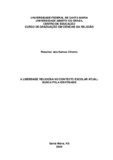| dc.contributor.advisor | Rossatto, Noeli Dutra | |
| dc.creator | Oliveira, Rosemar dos Santos | |
| dc.date.accessioned | 2021-03-05T16:58:04Z | |
| dc.date.available | 2021-03-05T16:58:04Z | |
| dc.date.issued | 2020-12-01 | |
| dc.date.submitted | 2020 | |
| dc.identifier.uri | http://repositorio.ufsm.br/handle/1/20380 | |
| dc.description | Trabalho de conclusão de curso (graduação) - Universidade Federal de Santa Maria, Centro de Educação, RS, 2021 | por |
| dc.description.abstract | This article started from the need to seek answers to the following question: how is religious freedom configured in school spaces, in particular Afro-Brazilian religions? It aimed to reflect on religious freedom in the school context, verifying how the search for identity, in the religious sense, is understood by the school, in particular, regarding religions of African origin. More specifically, we sought to: carry out a brief analysis of religious freedom since the most remote times, focusing on the context of the emergence of this right in the Universal Declaration of Human Rights; differentiate between Religion and Religiosity; to talk about the right to religious freedom, as well as the relationship between the various religions and the State and to verify how schools conceive the teaching of Afro-Brazilian religions, considering religious diversity. The justification focused on the importance of understanding how to deal with a current and intriguing theme for the school and society, combining the personal experiences of the author of this production. A bibliographic research methodology was used, looking for data from different sources, in print, online and knowledge acquired during the training course, as well as selected literature during the course and that bring relevant information on the subject. The final considerations point out the understanding that the study of religions must allow the establishment of elements that guarantee the right to alterity and difference without destroying the dialogue and communion necessary to recognize the other as essential for the creation of a new world. | eng |
| dc.language | por | por |
| dc.publisher | Universidade Federal de Santa Maria | por |
| dc.rights | Acesso Aberto | por |
| dc.rights | Attribution-NonCommercial-NoDerivatives 4.0 International | * |
| dc.rights.uri | http://creativecommons.org/licenses/by-nc-nd/4.0/ | * |
| dc.subject | Identidade | por |
| dc.subject | Escola | por |
| dc.subject | Liberdade religiosa | por |
| dc.subject | Religious freedom | eng |
| dc.subject | School | eng |
| dc.subject | Identity | eng |
| dc.title | A liberdade religiosa no contexto escolar atual: busca pela identidade | por |
| dc.title.alternative | Religious freedom in the current school context: search for identity | eng |
| dc.type | Trabalho de Conclusão de Curso de Graduação | por |
| dc.degree.local | Santa Maria, RS, Brasil | por |
| dc.degree.graduation | Ciências da Religião | por |
| dc.description.resumo | Este artigo partiu da necessidade de buscar respostas para a seguinte pergunta: como se configura a liberdade religiosa nos espaços escolares, em particular as religiões afro-brasileiras? Teve como objetivo refletir sobre a liberdade religiosa no contexto escolar, verificando como a busca pela identidade, no sentido religioso, é compreendido pela escola, em particular, quanto às religiões de matriz africana. De modo mais específico buscou-se: realizar uma breve análise da liberdade religiosa desde os tempos mais remotos, enfocando o contexto de surgimento desse direito na Declaração Universal dos Direitos Humanos; diferenciar Religião e Religiosidade; discorrer sobre o direito à liberdade religiosa, bem como o relacionamento entre as várias religiões e o Estado e verificar como as escolas concebem o ensino das religiões afro-brasileiras, considerando a diversidade religiosa. A justificativa centrou-se na importância da compreensão de como tratar de um tema atual e intrigante para a escola e a sociedade, aliando as experiências pessoais da autora desta produção. Utilizou-se uma metodologia de pesquisa bibliográfica, buscando dados em diferentes fontes, impressos, online e conhecimentos adquiridos no decorrer do curso de formação, bem como literaturas selecionadas durante o curso e que trazem informações relevantes sobre o assunto. Nas considerações finais aponta-se o entendimento de que o estudo das religiões deve permitir o estabelecimento de elementos que garantam o direito à alteridade e à diferença sem destruir o diálogo e a comunhão necessários para reconhecer o outro como essencial para a criação de um novo mundo. | por |
| dc.publisher.country | Brasil | por |
| dc.publisher.initials | UFSM | por |
| dc.subject.cnpq | CNPQ::CIENCIAS HUMANAS::TEOLOGIA | por |
| dc.publisher.unidade | Centro de Educação | por |



